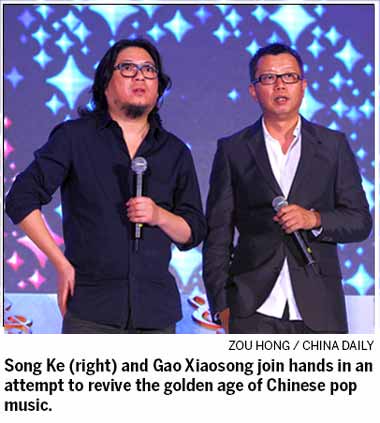Staging a comeback
Updated: 2012-06-29 10:56
By Chen Nan (China Daily)
|
||||||||

As the mainland music industry languishes on life support, two 16-year industry veterans are attempting to resuscitate it through revamping its concert sector.
They're Song Ke, founder and former CEO of Taihe Rye Music - a top-performing company with such pop stars as Li Yuchun and Lao Lang - and songwriter and music producer Gao Xiaosong, who ushered in the campus folk music genre in 1994.
The duo has taken the helm of the new label Evergrande Music. The label was founded on June 18 in Beijing by Evergrande Real Estate Group, one of the country's 10 largest real estate developers.
"It's another year of plummeting music sales, and many Chinese record company executives are contemplating other methods or are simply giving up," says Song, who has become Evergrande's managing director.
"We've been taking risks and survived in this industry for the past 16 years. Everything was new for us back then, so we're confident we can make it in this new era."
The company was registered in October 2010 with a 850 million yuan ($134 million) investment. Song and Gao are also shareholders.
"We invested in this company out of our own pockets," says Gao, managing director for the company's music department.
"We're not hired by someone. We work for ourselves."
The company's first move was to make the mainland's largest music copyright purchase - of 3,500 songs.
Online research undertaken in 2012 shows 85 percent of Internet users listen to music every day, Gao says.
"That means there's still demand for music," he says.
"It's not dying. We can use the copyrights to make the music market better. The Internet and digital music have changed things. We hope to create a healthy circle for Chinese songwriters."
Song surprised many when he opened a Peking duck restaurant in February.
But he says he isn't leaving the music industry.
"I have a professional team to run the restaurant. With the new music company's launch, I feel my second spring is coming," Song says, laughing.
His strategy for building up the label is corporatizing concerts.
Song's first move will be staging 10 shows by rock singer-songwriter Wang Feng. Wang staged eight performances nationwide in 2011. Evergrande will hold 10 concerts for Wang within five months in 2012 - at least two concerts a month, Song says.
"The systematic management of concerts not only promotes the musician and his music but also builds up the organizer's image in the concert sector," Song says.
The gurus say they'll not only host performances by established stars but will also discover new talent.
The company's first new singer-songwriter is 16-year-old Zhou Ziyan, who rose to fame by playing guitar in online videos. She will release four albums under the label.
The company will recruit musicians and producers with whom they've long cooperated, Wu says.
Evergrande Music's chairman Wu Xuedan says the real estate company's investment "sustains the music industry's future".
The label isn't the company's first non-real estate venture. In 2010, it bought the Guangzhou Football Team for 100 million yuan and renamed it the Guangzhou Evergrande Football Club. The soccer team is the current Chinese Super League champion.
The real estate company has 28 branches nationwide that will back up the music tours. Wu says the company's good relationship with foreign investors will help it expand overseas.
Song and Gao say they hope to diversify the music industry, which is currently lopsided toward hip-hop.
"We don't lack good music but need clever promotion plans and creative presentations," Song says.
Song and Gao have been friends since 1994, when Gao released his first collection, Collegiate Ballads 1, which was the top-selling album of the year and won almost all of that year's pop prizes. Song's record company has since released all of Gao's music.
"The company will become China's version of Live Nation," music critic Hao Fang says.
"There's no doubt about the pair's ability to create. They've proven that. Given their money and experience, the future seems bright - but unpredictable. They need to pave a new way because the world is so different from their heyday."
chennan@chinadaily.com.cn

 'Taken 2' grabs movie box office crown
'Taken 2' grabs movie box office crown
 Rihanna's 'Diamonds' tops UK pop chart
Rihanna's 'Diamonds' tops UK pop chart
 Fans get look at vintage Rolling Stones
Fans get look at vintage Rolling Stones
 Celebrities attend Power of Women event
Celebrities attend Power of Women event
 Ang Lee breaks 'every rule' to make unlikely new Life of Pi film
Ang Lee breaks 'every rule' to make unlikely new Life of Pi film
 Rihanna almost thrown out of nightclub
Rihanna almost thrown out of nightclub
 'Dark Knight' wins weekend box office
'Dark Knight' wins weekend box office
 'Total Recall' stars gather in Beverly Hills
'Total Recall' stars gather in Beverly Hills
Most Viewed
Editor's Picks

|

|

|

|

|

|
Today's Top News
Health new priority for quake zone
Xi meets US top military officer
Japan's boats driven out of Diaoyu
China mulls online shopping legislation
Bird flu death toll rises to 22
Putin appoints new ambassador to China
Japanese ships blocked from Diaoyu Islands
Inspired by Guan, more Chinese pick up golf
US Weekly

|

|







